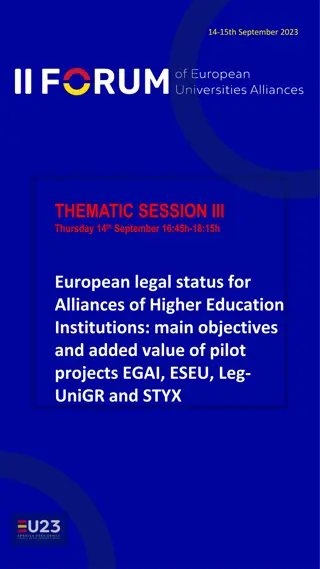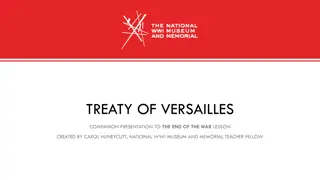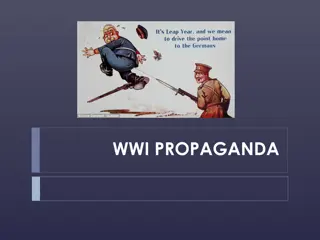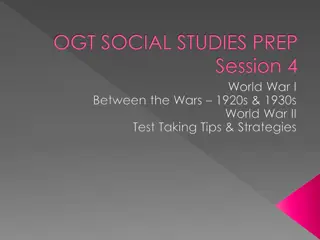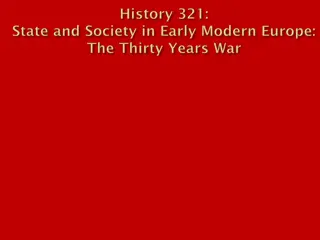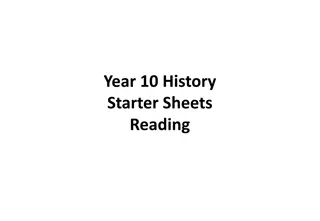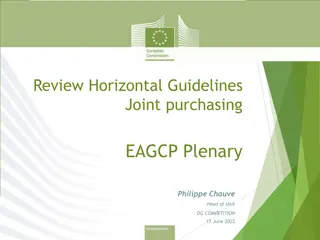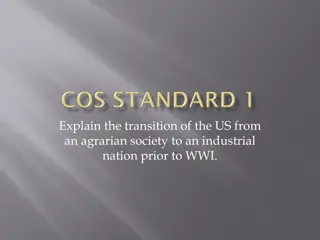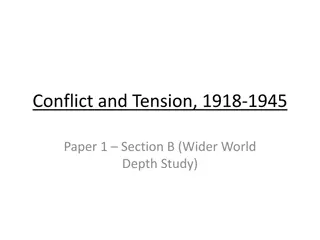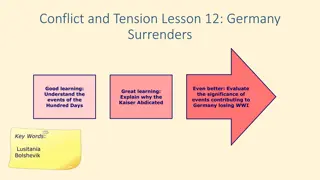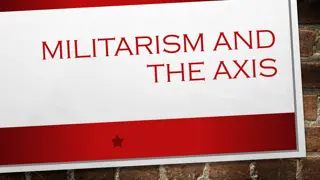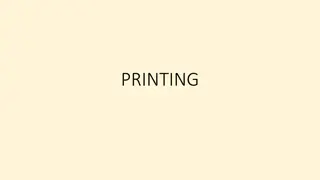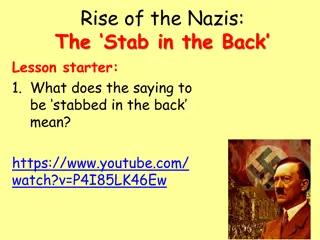Historical Background of WWI: Causes, Alliances, and Impact
World War I (WWI) was a global conflict that began in 1914, shaped by imperialism, political alliances, and technological advancements. The war had significant historical and social consequences, leading to the deaths of millions and major political changes. Propaganda, war poetry by both pro-war and anti-war poets, and the use of new technologies like poison gas and airplanes were defining aspects of WWI.
Download Presentation

Please find below an Image/Link to download the presentation.
The content on the website is provided AS IS for your information and personal use only. It may not be sold, licensed, or shared on other websites without obtaining consent from the author.If you encounter any issues during the download, it is possible that the publisher has removed the file from their server.
You are allowed to download the files provided on this website for personal or commercial use, subject to the condition that they are used lawfully. All files are the property of their respective owners.
The content on the website is provided AS IS for your information and personal use only. It may not be sold, licensed, or shared on other websites without obtaining consent from the author.
E N D
Presentation Transcript
THE OUTLINE OF THE WEEKS 7-8 Historical, Social Background of WWI Veiled reason of WWI Significance of WWI Propaganda of the War and the Recruiting Pro-War Poets Theory of War Poetry Anti-War Poets and their Stances.
ABOUT WORLD WAR I (1914-1918) World War I (WWI), also known as the Great World War, was a global war centered in Europe that began July 1914 and lasted until November 1918. More than 9 million fighters were killed: death was increased by technological advancements, deadlock and the reliance of human wave attacks. It encouraged major political changes, like revolutions in many of the nations involved e.g. Russia.
The war included all the world's great economic powers, which were in two alliances: the Allies (Britain, France and the Russian Empire) and the Central Powers of Germany and Austria-Hungary. These alliances expanded as more nations entered the war: Italy, Japan and the USA joined the Allies, and the Ottoman Empire and Bulgaria the Central Powers. More than 70 million military personnel, were used in the then-largest war in history.
Although a revival of imperialism was an underlying cause, the immediate trigger for war was the assassination of Archduke Franz Ferdinand of Austria. This set off a diplomatic crisis and international alliances formed over the previous decades were summoned. Within weeks, war started and the conflict soon spread around the world. German forces attempted to march to Paris but were stopped by the French army. They settled in an area known as the Western Front, with a trench line that would change little until 1917. Most of the British war poets would have fought and lived in the trenches.
The War was especially noticeable for the use of new 20th century technologies such as planes, poison gas, huge guns, bombs etc. whilst using 19th century war tactics. This lead to the millions of deaths and casualties. No one had ever seen such horrors on such a wide-scale before. WWI left a profound and frightening impression upon the consciousness of Europe and her people, as well as the rest of the world.
VEILED REASON OF THE CONFLICT Imperialism, Colonial interests ( a way of economical system collaboted with military forces, by means of which a country takes over new lands or countries and rules over them). By 1900 the British Empire ruled over countries in five continents and France had control of large areas of Africa. With the rise of industrialism countries needed new markets. The amount of lands 'owned' by Britain and France increased the rivalry with Germany who had entered the scramble to acquire colonies late and only had small areas of Africa. Imperialist countries narrowly avoided war many times as they struggled to divide Africa among themselves in the early 1900's.
SGNFCANCE OF WW1 The First World War runs through the British modern-day psyche like no other conflict. It has been described as Britain's 'Vietnam', where the true horror of War touched everyone and everything in the country, breaking through the class barrier and irreversibly altering the social structure of the nation. It also closely parallels Vietnam as it represents an overwhelming feeling of futility, in that so many lives were wasted for such little gain. Unlike the Second World War, which more easily falls into the 'just war' definition of right versus wrong, the First World War appears as a conflict with aims that were quickly lost, degenerating to a war of attrition in unbelievable conditions.
Martin Stephen in The Price of Pity (1996) summarises the horror of the conflict as follows: "The European powers were mighty in their strength and wealth. They were neither wholly good nor wholly bad, and were brought to near- destruction by powers of ambition, greed and aggression that had always been there but which had never before led to destruction on such a scale. The war evoked pity and terror like no other, and when peace was declared there was an almost animal venting of emotion in the streets of Britain. It unleashed untold suffering on Europe, a suffering that went out of the control of any human agency and which toppled some monarchies and shook other nations to their roots. (236)
PROPAGANDA OF THE WAR AND THE RECRUITING
The Great War / World War I became an occasion for a crusade that saw the mobilization of an extraordinary language filled with abstract euphemistic spiritualized words and phrases under which were buried the realities of modern mechanized war. National newspapers, like the Times, regularly printed articles and editorials with titles like Renewal of Youth , Glorious Baptism of Fire, War and Sacrifice, and Heroes: Response to the Ideal. For those who used such language, maimed or shell- shocked soldiers did not exist, only broken heroes. The longer the war lasted, the more ridiculous such elegant words and asinine language sounded to the majority of the common soldiers in the trenches.
During the Great War the most recognized and admired poets, including those who had served on the western fro t and knew first hand of the slaughter and horrors of trench warfare, not only supported the war effort but also encouraged its continuation. These admired war poets hid the horrible truth of modern mechanical warfare using archaic language and lofty phrases. The prevailing voices during the war were those who wanted to continue the struggle. But unknown to the public, an unknown number of these prevailing voices were members of secret organization of eminent writers working with the War Propaganda Office at Wellington House.
The outbreak of the Great War was such an event; there was a massive increase patriotic verse, the majority written in high diction. Amateur poems on patriotic themes filled newspapers throughout the country. The propaganda was successful in that most people seemed genuinely convinced that their nation s cause was just and H. G. Wells was one of those people. Although foreseeing military tanks, aerial warfare, atomic bombs in his science fiction books, he was not so accurate all the time, especially as regards the nature of the war. In his collected letters, Wells supports the war effort as he calls it a war against militarism. In his article Why Britain Went to War , he insists that This is now a war for peace. He further adds that every soldier who fights against Germany now is a crusader against war. Finally, Wells states that this, the greatest of all wars, is not just another war-it is the last war!
PRO-WAR POETS (BRITISH POET S CALL TO ACTION)
For Kipling, the issue is the very existence of England as a nation. While invoking every possible appeal to nationalism, his forty line call to action poem, For All We Have and Are constantly reiterate the passing of Comfort, content, delight . Now that the war has begun, he argues the need for fortitude, and repeats his assertion that only the sacrifice of body, soul, and will can make England prevail, For All We Have and Are begins with the urgency of the struggle.
For all we have and are, For all our children's fate, Stand up and meet the war. The Hun is at the gate! Our world has passed away In wantonness o'erthrown. There is nothing left to-day But steel and fire and stone. Though all we knew depart, The old commandments stand: "In courage keep your heart, In strength lift up your hand."
Once more we hear the word That sickened earth of old: "No law except the sword Unsheathed and uncontrolled," Once more it knits mankind, Once more the nations go To meet and break and bind A crazed and driven foe. Comfort, content, delight -- The ages' slow-bought gain -- They shrivelled in a night, Only ourselves remain To face the naked days In silent fortitude, Through perils and dismays Renewd and re-renewed.
Though all we made depart, The old commandments stand: "In patience keep your heart, In strength lift up your hand." No easy hopes or lies Shall bring us to our goal, But iron sacrifice Of body, will, and soul. There is but one task for all -- For each one life to give. Who stands if freedom fall? Who dies if England live?
This poem addresses the people of England, especially the men. He encourages them to serve the country during these times of great war and violence. He says that we all have to be brave and fight with our souls. The poet describes and reports the events at the same time. It s simultaneous with the present. Rudyard Kipling wants the people to fight for their country. He underlines that the English soldiers have to be brave and they cannot fear death. They have to be prepared to sacrifice their lives and souls.
Kiplings writing whether in prose and verse represent a divided self remarking different kinds of truth telling . One impulse voices experience , while the other advocates ideas . Here is what can be termed as his idea . His belief in the war pervades the poem and bears the pre-war patriotic sentiment. The war is worth fighting since the enemy is at the gate . The speaker urges the readers to stand up and meet the war. The German described as the Hun is at the gate , which indicates the nearness of the danger. This war is not so much desired; however, there is nothing left to-day/ But steel and fire and stone .
The speaker is sure of the fact that though all we knew depart, there is still something that is valid from the knowledge of the past. As it used to be, the dictum that the old used is still valid In courage keep your heart/ In strength lift your hand. The speaker is of the opinion that it is time for the law of the sword/unsheathed and uncontrolled . The German is a crazed and driven foe and the nations are united to meet and break and bind this enemy. The final stanza clearly states that the duty of preventing the fall of freedom is not an easy one because the victory will come at a price. The goal will not be reached through easy hopes or lies but through iron sacrifice . The sacrifice requires the task for all which is each one life to give. The speaker supports his argument with two questions at the end of the stanza Who stands if freedom fall/ Who dies if England live?
Brooke's entire reputation as a war poet rests on only 5 "war sonnets. Brooke's war experience consisted of one day of limited military action with the Hood Battalion during the evacuation of Antwerp. Consequently, his "war sonnets" swell with naive sentiments of the most general kind on the themes of maturity, purpose and romantic death the kind of sentiments held by many (but not all) young Englishmen at the outbreak of the war. Died of blood poisoning from a mosquito bite while on the way to Gallipoli with the Navy. Therefore, It is ironic that Rupert Brooke is known principally as a war poet indeed one of the most famous poets of World War I.
There were five sonnets in the 1924 sequence, as well as a sixth, "The Treasure,"which Brooke had written before the others, in August 1914, shortly after the declaration of war. The other five were written toward the end of 1914, numbered I to V, and entitled "Peace," "Safety," "The Dead (part 1)," "The Dead (part 2)," and "The Soldier." These sonnets are traditional in form, Petrarchan sonnets with the octets grammatically and semantically separate from the sestets. "The Treasure," on the other hand, inverts the form and begins with the sestet. All these sonnets are built around one unifying theme: that of sacrificial death. Death, England, honour, and sacrifice are the central ideas throughout; love, the subject that had formerly occupied so much of Brooke's thought and work, has become only a "little emptiness."
If I should die, think only this of me: That there's some corner of a foreign field That is for ever England. There shall be In that rich earth a richer dust concealed; A dust whom England bore, shaped, made aware, Gave, once, her flowers to love, her ways to roam, A body of England's, breathing English air, Washed by the rivers, blest by suns of home. And think, this heart, all evil shed away, A pulse in the eternal mind, no less Gives somewhere back the thoughts by England given; Her sights and sounds; dreams happy as her day; And laughter, learnt of friends; and gentleness, In hearts at peace, under an English heaven. (Norton Anthology, p.1327)
The Soldier is perhaps Rupert Brookes best-known and loved work and may be the most famous single poem of the war. The Soldier completes the 1914 sonnets, ending the series on a note of patriotic self-sacrifice and determined steadfastness. The poem, an example of patriotic sentimentalism, glorifies the death of the soldier. The speaker says that the death of the soldier will make some corner of a foreign land for ever England , through the description of the England with its pure, unspoiled lands. Rupert Brooke, in this poem, idealizes and romanticizes war as an ennobling and transcendental experience. However, it is noteworthy that he wrote this poem before witnessing the reality of the war and its horrors. He did not survive to see how profoundly the world would be suffering from the physically and morally traumatic effects of the war.
An English journalist, humorist, and writer of light verse, chiefly remembered for her patriotic, motivational poems written during the Great War. Her reputation declined at the same time as those of the poet who exposed the horror of trench warfare, such as Siegfried Sassoon, Wilfred Owen, and Isaac Rosenberg, increased. Owen s famous Dulce et Decorum est is addressed to her. Pope s poems, by contrast, encouraged men to enlist in the war effort or propagated women s participation in the home front effort. The recruitment campaign had slogans such as Women of England Say Go which directly addressed them. Women were asked to put pressure on the men in their lives to enlist
Jessie Pope was one of the women poets who answered the call of the Committee of Propaganda and she undertook the task to write in order to encourage the young to enlist. The speaker in her infamous poem The Call asks: Who s for the trench Are you, my laddie? Who ll follow French Will you, my laddie? Who s fretting to begin, Who s going out to win? And who wants to save his skin Do you, my laddie?
Whos for the khaki suit Are you, my laddie? Who longs to charge and shoot Do you, my laddie? Who s keen on getting fit, Who means to show his grit, And who d rather wait a bit Would you, my laddie? Who ll earn the Empire s thanks Will you, my laddie? Who ll swell the victor s ranks Will you, my laddie? When that procession comes, Banners and rolling drums Who ll stand and bite his thumbs Will you, my laddie?
The depiction of a quick glory in this poem was criticized by Wilfred Owen in Dulce et Decorum Est . The first draft was directly addressing Jessie Pope because she was not aware of what the soldiers were suffering in the trenches and as the horrors of the war were revealed, the popularity and the effect of these poems faded away. The majority of the women poets believed in the nobility of the soldiers who sacrificed their lives for the security and peace of England.
THEORY OF WAR POETRY Alexander Pope describes poetry as what oft was thought but ne er so well expressed . In his Preface to Lyrical Ballads, William Wordsworth describes poetry as the spontaneous overflow of powerful feelings and adds that the origin comes from emotion recollected in tranquillity. In his Preface, Owen states that the true poet must be truthful and in an implied way describes poetry as having the function to warn and to tell the truth . The poet undertakes a task that is different from that of the other periods, and this time he has the role to warn not to so well express and to tell the truth not to recollect emotions in tranquillity .
Tim Kendall in the Introduction to The British and Irish War Poetry (2007) states that the term war poetry has become so familiar that its internal tensions often go unnoticed. He further adds that it seems hard to imagine two human activities more unlike each other than experiencing a war and writing a poem. Since for him, the war suggests destruction, chaos, and pain while poetry suggests creation, order, and pleasure. Finally, he concludes that war poetry accommodates binary oppositions, most notably life and death.
One distinguishing aspect of the poetry of the First World War is that it largely deals with the grim realities of the war. The disturbing images of the war- the barbed wires, mud, rats and corpses scattered around - have become ineffaceable due to the poems of the poets who wrote for several purposes. They wrote these poems mainly in order to reduce the distance between themselves and the non-combatants. The poetry of Great War is known for its graphic depictions of the battlefields. The poets who were writing their poems in response to the war did not lay the emphasis on the artistic qualities but on the didactic aspects, because they were much more interested in informing the civilians about what really was happening on the battlefields. These poems with the new informations were welcomed by the civilians who were desperately in search of hearing from the trenches where the soldiers were fighting.
War poetry was first classified by Jon Silkin and in his introduction to The Penguin Book of First World War Poetry, he suggests that the four stages of consciousness to be found in the poetry of the Great War: (1) a passive reflection of, or conduit for, the prevailing patriot ideas (Brooke and Sassoon s earliest poems); (2) a protest of war through the recreation of physical horror (Sassoon); (3) compassion (Owen); and (4) a merging of anger and compassion into an active desire for change (Rosenberg)
Another approach to the classification of the war poetry comes from Michael Copp. He divides the poetry of Great War into five categories: (1) nationalist poetry which is full of enthusiasm for war (2) celebratory poem which is full of courage and fortitude of the fighting men (3) descriptive or narrative poetry which attempts to recreate and preserve the nightmare topography and suffering of battlefields (4) Elegiac poetry that expresses grief for dead (5) Poetry of protest, which expresses indignation, often in bitter satire.
Symbolic Anti-War Poet, targeted old generation, politicians and profiteers, civilian soldier, made proclamation to not fight in war in 1917. Remembered for his angry and satirical poems of the First World War. Evoking the soul-wrenching terror and brutality of trench warfare, Sassoon vigorously denounced generals, politicians, and churchmen for their incompetence and blind support of the war. Although Sassoon continued to write after the war, his later poems, which were often concerned with religious themes, received less critical acclaim than his war poems.
the second stage of consciousness to be observed in the war poetry is anger and Sassoon is a good example of it. By means of his characters in the poems, Sassoon fulfils in the role of the angry prophet . Sassoon follows various ways of protesting through the recreation of physical horror such as in Suicide in Trenches ; through anger and satire in poems such Glory of Women , and The General ; and through sardonic distancing in They . Sassoon is successful in conveying the message no matter which tone he uses in his poems. He directs his anger, which results from his protest of war, to everyone who forms the group of non-fighters.




